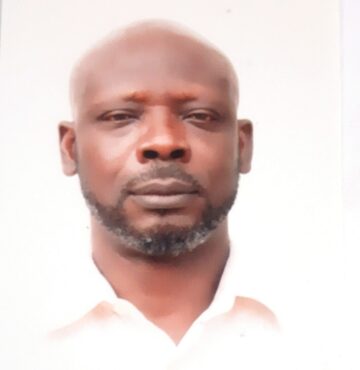
OGUNFOLABI Kayode Omoniyi
Email address(es): kogunfol@oauife.edu.ng
Office Address: HB III 405C, Department of English, Obafemi Awolow
ORCID iD: 0000-0001-8419-5631
Academic Qualifications: BA (English); MA Literature in English; MA Comparative Literature; PhD English
Areas of Specialization: Anglophone Postcolonial Fiction; Magical/Marvelous Realist Fiction; Literary Theory; Trauma Studies; Nigerian Women’s Fiction; Film Studies
Title of M.A. Thesis: Animist Consciousness in Ben Okri’s The Famished Road and Songs of Enchantment
Title of Ph.D. Thesis: History, Horror, Reality: The Idea of the Marvelous in Postcolonial Fiction
Fellowships:
Michigan State University Graduate School Summer Fund, Summer 2008;
Riggle Fellowship in the Humanities, Summer 2009;
Special Initiative Fund, Spring 2009; ACLS/AHP Postdoctoral Fellowship, July 2012 – June 2013;
DAAD – Research Stays for University Academics and Scientists, Humboldt University, Berlin, Germany – July 2017-August 2017;
Netherlands Institute of Advanced Studies Fellowship, 2023/2024
Ongoing Current Research: Towards a New Nollywood; Beyond “the Human Stain”: Racial Fantasy and the Reconstruction of Blackness in Derek Walcott’s Dream on Monkey Mountain
Publications:
“Osonye Tess Onweme’s Tell It to Women, Or Negotiating Gender and Sexuality at Postcolonial Crossroads,” Emerging Perspectives on Tess Osonye Onweme, edited by Maureen Ngozi Eke. Trenton: Africa World Press, 2022.
“The ‘Other’ Body: Micro Aggression and Trauma of Female Objectification in Sefi Atta’s Everything Good Will Come.” Research in African Literatures. Vol. 52, No. 4, Winter. 43-62
“Recovering the Uneventful: Trauma and Survival in Sade Adeniran’s Imagine This.” Kente: Cape Coast Journal of Literature and the Arts. Vol. 3, No. 1 May 2022. 23-39.
“Towards a Performative Representation of Women in Cinema: Rebecca, Cléo from 5 to 7, and Women on the Verge of a Nervous Breakdown.” Literature and Popular Culture: Quest for Humane Development, edited by Oyeniyi Okunoye et al. Zaria: Ahmadu Bello University Press, 2022. 416-436.
“Re-writing motherhood in Flora Nwapa’s Efuru.” UMMA: Journal of the Contemporary Literature and Creative Arts, Vol. 8, No. 1, 2021. 1-18
“Where are the Natives?: Mongo Beti’s Mission to Kala as Parody of Authenticity,” Lagos Review of English Studies: A Journal of Language and Literary Studies, Vol. 20, No. 1, 2021. https://laresunilag.com/where-are-the-natives-mongo-betis-mission-to-kala-as-parody-of-authenticity/
“Between Primordial Nationality and Performative Identity: Rethinking Subjectivity in Sade Adeniran’s Imagine This.” Texts and Contexts of Migration in Africa and Beyond, edited by Oluwole Coker and Adebusuyi Adeniran. Austin, Texas: Pan-African University Press, 2021. 83-96.
“Biracialism and Trauma in Kaine Agary’s Yellow-Yellow.” Tydskrif vir Letterkunde. Vol. 56, No. 2, 2019. 38-45. https://doi.org/10.17159/2309-9070/tvl.v.56i2.4664
“The Mime that Haunts Mimesis: Resistance to Imperial Rule in Chinua Achebe’s Arrow of God.” ODU: A Journal of West African Studies. No. 47, July 2018. 158-173.
“The Lives of Others: Trauma and Precariousness in Sefi Atta’s Everything Good Will Come.” Postcolonial Text. Vol. 13, No. 4. 2018. 1- 15. postcolonial.org/index.php/pct/article/view/2353/2247
“Lesbianism and the Subversion of Heterosexual Masculinity in Lola Shoneyin’s The Secret Lives of Baba Segi’s Wives.” Emerging Perspectives on the Twenty-First Century Nigerian Novel, edited by Chijioke Uwasomba et al. Germany: Galda Verlag, 2017. 209-222.
“Female Body, Discipline, and Emerging Male Spectatorship in Yoruba Video Film.” The Global South. Vol. 7 No 1. Spring 2013. 79-97.
“Nigerian Video Films, Yoruba Comedy Shows, and the Dialectic of Political Engagement.” Politics, Culture and Development in Nigeria: A Festschrift for Gabriel Olatunde Babawale, edited by Akin Alao. Lagos: Centre for Black and African Arts and Civilization, 2011. 151-164.
“Fictionalizing the Crisis of the Environment in Ben Okri’s The Famished Road and Songs of Enchantment.” Landscape. Environment and Technology in Colonial and Postcolonial Africa, edited by Toyin Falola and Emily Brownell. New York: Routledge, Fall 2011. 273-290.
“Representations of War and Peace in Selected Works of Ben Okri.” Narrating War and Peace in Africa, Toyin Falola and Hetty ter Haar. New York: University of Rochester Press, 2010. 180-194.
“Tensions of Modernity in Flora Gomes’s The Blue Eyes of Yonta.” English Studies in Canada (ESC) Vol. 32 Issue 2 March 2006. 141-156.
“Subjectivity in Flora Gomes’s The Blue Eyes of Yonta.” Storytelling: A Critical Journal of Popular Narrative. Vol. 5 No 4. Summer 2006. pp. 249-258.
“On Identity and ‘Separation of Word from History’.” ATENEA. Vol 24. No 2. December 2004. pp. 39-50.
“The Question of Violence in Richard Wright’s Native Son.” Taiwan Journal of English Literature. Vol 2 No 2. Fall 2004. pp. 1-25.
“Fela, Uniting Black Struggle in Song: ‘Red Hot Riots’ from ‘West Africa’ to ‘West Broadway.’ Proudflesh: A New Afrikan Journal of Culture, Politics and Consciousness. Issue 3., 2004. http://proudfleshjournal.com/issue3/ogunfolabi.htm
“The Restorative Value of Violence: African American Liberation Struggle in the Post World War II Era” Proudflesh: A New Afrikan Journal of Culture, Politics and Consciousness. Issue 1., 2002. <http://proudfleshjournal.com/vol1.1/ogunfola.pdf>
“From Oral Narrative to Written Fiction: The Contemporary African Novel.” ISALA. No 1. Vol 2. Obafemi Awolowo University Press, Ile-Ife, 2000. pp. 94-102.
